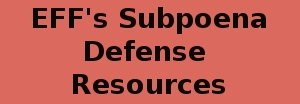Our latest work on media policy and intellectual property policy.
Learn about our services
Learn about our legal services for: App Developers, Artists & Graphic Designers, Bloggers & Journalists, Clothing Designers, Entrepreneurs, E-commerce Business People & Startups, Filmmakers & YouTube creators, Public Broadcasting producers,Game Developers, Internet users & Smartphone users, Makers, Musicians, Non-Profits, Photographers, Scholars, Researchers, and Writers and Publishers.








 Here's what we've been up to lately:
Here's what we've been up to lately: New Media Rights' latest blog post is all about navigating a lawsuit, and
New Media Rights' latest blog post is all about navigating a lawsuit, and